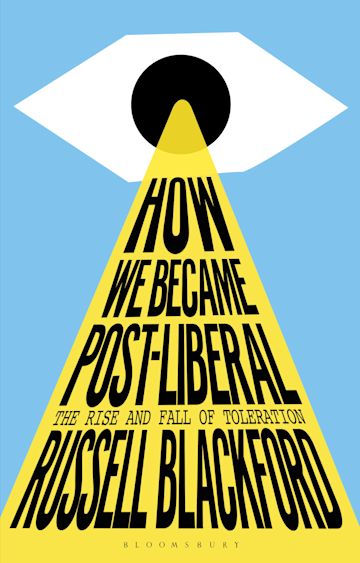 Reviewed by Magdalena Ball
Reviewed by Magdalena Ball
How we Became Post-Liberal:
The Rise and Fall of Toleration
By Russell Blackford
Bloomsbury Academic
Paperback, January 2024, 272 pages, ISBN-13: 978-1350322943
As soon as I heard the title of Russell Blackford’s new book I knew I had to get hold of it. You’d have to be living under a rock not to have noticed how polarised our society has become, a trend that seems to be getting worse. Blackford makes a solid case that we have moved from being (almost) a liberal democracy governed by principles like personal liberty, freedom of speech and tolerance of conflicting worldviews into a different phase – one where what once was a social justice movement focusing on the common good has become a rigid orthodoxy engaged in shutting down debate and shaming/hurting those that don’t toe the party line. In other words, intolerance.
Blackford’s thesis traces the historic roots of persecution and tolerance from the ancient world through the rise of Christianity, exploring religious intolerance and skepticism, and the ways in which liberal ideas were shaped through the currents of history. The book explores a range of bigotries from religious intolerance, racism, antisemitism, homophobia and misogyny against a backdrop of economic transition, education, revolution, war, law and political movements, analysing the inherent connections. The work cites and is built around many influential thinkers like Locke, John Stuart Mill, Spinoza, Humboldt, and many others, enacting a long tradition of philosophical scholarship:
One leading figure in developing, inspiring and advocating liberalism during its early decades was the Swiss-French author and statesman Benjamin Constant, who in turn was influenced by Locke, Montesquieu and the early ideals of the French Revolution. Today, he is most remembered for his distinction between the liberty of the ancients and that of the moderns, whereby a ‘modern’ conception of liberty involves individual freedom from the demands of others, including the state. (96)
Blackford’s knowledge is wide-reaching and he constructs his arguments carefully, with evidence that encompasses history, law, and philosophy, making it clear that the first step in combating intolerance is to understand how and why it arises. The book explores the way in which both Christian-inspired social conservatism in the form of an ugly right-wing populism (MAGA being the classic example) and left-wing authoritarianism arising out of a combination of factors – the disappointment of the sixties’ counter culture, or the university led ‘post-modern’ focus on power structures, where everything is seen through a lens of social subjugation and oppression:
Radicals of the time had grown more pessimistic about their ability to produce rapid, overdue change through political movements based on liberal values. There was a sense that the legal and political victories obtained to date had been incomplete and insufficient, that they’d achieved little in improving the situation of people belonging to subordinated groups. Indeed, there was a perception of hard-won gains actually being reversed. What we call the Long Sixties was thus an era of momentous change, but one that ended with radicals feeling disappointed, disillusioned and open to new approaches. (163)
There are many different examples of the negative impacts of this, one of the more extensive being that of Salman Rushdie’s fatwā by Ayatollah Khomeini in 1989. Rushdie has recently written and spoken of how few of those who threatened him, including the recent stabber, had actually read the book that created so much outrage: The Satanic Verses. Blackford cites Rushdie’s shock at the lack of support he received from colleagues on the left, who felt he needed to learn a lesson about respect – a lesson that ended, not in Rushdie’s apology though there were many – but in the loss of his eye, as well as the death of his translator and others.
This form of illiberalism is not gentle or peace loving, but the contradiction between Political Islam’s rejection of liberal and left-wing thought and the way in which they profess to represent the subordinated Muslims living in nations of the West is not lost on Blackford and how this has developed into a demanding inclusionary force that has become a dominant narrative in western universities or the “knowledge class”. The response to these forceful identity politics is the strengthening of a growing right-wing populism among the disenfranchised. These polarities are a horseshoe of extreme views exacerbated by social media with its algorithmic bubbles full of inflammatory images, ill-informed hyperbole, sharable memes, and above all, outrage that brooks no discussion or complexity.
Of course it’s impossible not to be gutted by the images that continue to fill our screens. I do think, at heart, that post-liberalism is actually underpinned by a sense of compassion and the desire to do better in our beleaguered world: to help those who are suffering, and to support the marginalised, something I am very much in favour of. But Blackford provides many examples of minor or even imaginary transgressions (and I know several other examples) that have resulted in a vicious online pile-on, loss of contracts, career derailments and even suicide in a few instances. Over-simplified and under-researched outrage that reduces the complexity of our work and lives to false binaries detracts from the many real crises in our world which need collaborative solutions that extend beyond performative policing. How We Became Post Liberal does a thorough job of teasing out both the roots of the rise this form of post-liberalism, and the implications, including the right-wing backlash on the other side of the horseshoe. The work culminates in a plea for toleration as the only sustainable way forward. While I can’t say I remained completely unconflicted reading this well-written book, Blackford’s call for a return to liberalism and a greater tolerance of intellectual pluralism and free expression strikes me as utterly sensible.